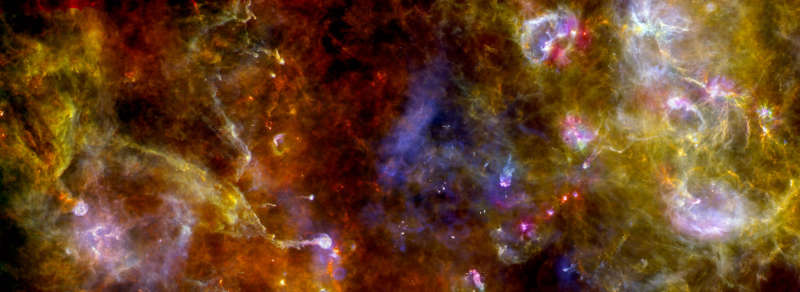
|
Credit & Copyright: ESA/PACS/SPIRE/
Martin Hennemann & Frédérique Motte,
Laboratoire AIM Paris-Saclay, CEA/Irfu - CNRS/INSU - Univ. Paris Diderot, France
Explanation:
The Herschel Space Observatory's
infrared view of Cygnus X
spans some 6x2 degrees across one of the closest, massive star
forming regions in the plane of our Milky Way galaxy.
In fact, the rich stellar nursery already holds the
massive star cluster known as the Cygnus OB2
association.
But those stars are more evident by
the region cleared by
their energetic winds and radiation
near the bottom center of this field, and are not detected by
Herschel instruments operating
at long infrared wavelengths.
Herschel does reveal the region's complex filaments of cool gas
and dust that lead
to
dense locations where new massive stars are forming.
Cygnus X
lies some 4500 light-years away toward the heart
of the northern constellation of the Swan.
At that distance this picture would be almost 500 light-years wide.
Laboratoire AIM Paris-Saclay, CEA/Irfu - CNRS/INSU - Univ. Paris Diderot, France
|
January February March April May June July August September October November December |
| ||||||||||||||||||||||||||||||||||||||||||||||||
NASA Web Site Statements, Warnings, and Disclaimers
NASA Official: Jay Norris. Specific rights apply.
A service of: LHEA at NASA / GSFC
& Michigan Tech. U.
Based on Astronomy Picture
Of the Day
Publications with keywords: Cyg X-1
Publications with words: Cyg X-1
See also:
